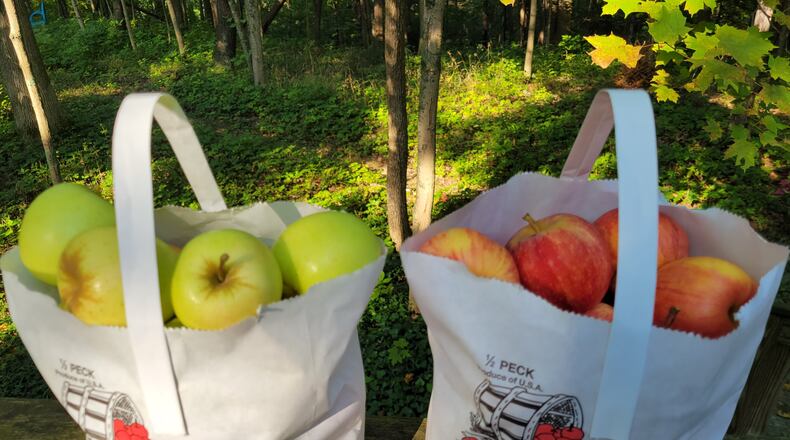The farm has 50 acres of orchard with 2,500 fruit trees, mainly apple, but also pear, plum and peach. Downing Fruit Farm has 75 varieties of apples, including a variety named for Downing.
The trees are so heavily laden with bright red apples that the green leaves are sometimes obscured. Walk through the orchard and pick your own apples, and see the farm in a horse-drawn carriage.
Scott’s great-great-great-great grandfather John Downing started the farm in 1838 with apple tree saplings and seeds brought west to the frontier. Scott is unaware if his ancestors knew Johnny Appleseed, but John Downing and Johnny Appleseed were doing the same thing at the same time in the same place.
Out here on the frontier in the early nineteenth century, a pioneer could lay claim to land through development of a permanent homestead. John Chapman (Johnny Appleseed’s real name) realized that a quick and easy way to make a successful claim was to plant 50 apple trees.
Chapman started apple tree nurseries across Ohio and got neighbors to care for the nurseries in exchange for a share of sales receipts. He was constantly on the go, traveling among his many nurseries.
Chapman made money selling some of his homesteads to other settlers, and by selling saplings from his nurseries to folks looking to settle other homesteads. When he died in 1845, he owned more than 1,200 acres, not counting the land he bought and then sold.
In the nineteenth century, all apples were tart. They were grown for making hard cider and applejack rather for eating.
Michael Pollan wrote that Chapman was “our American Dionysus,” because he brought “the gift of alcohol to the frontier.” The cider market disappeared during the 1920s Prohibition, so now most apple varieties are for eating.
A statue of Johnny Appleseed stands in Cincinnati’s Spring Grove Cemetery, where some websites incorrectly claim he is buried. He is depicted as barefoot, of course, with a bag slung over a shoulder, unnaturally tall, looking up to the heavens, holding an apple sapling high in the air.
Scott was one of the local growers instrumental in getting MOON Co-op Grocery open, because the large supermarkets wouldn’t take their produce, even though it is fresher and more nutritious than the produce imported from elsewhere.
Admission is $4 for the Hueston Woods Apple Butter Festival and free for the Downing Fruit Farm Festival. Downing’s address is 2468 Harrison Road, New Madison, Ohio 45346. It’s about a 1-hour drive north from here.
MOON Co-op is Oxford’s consumer-owned full-service grocery, featuring natural, local, organic, sustainable, and Earth-friendly products. The store, located at 516 S. Locust St. in Oxford, is open to the public every day. Visit the website at mooncoop.coop.
HOW TO GO
Hueston Woods Apple Butter Festival, 6924 Brown Road, Oxford; 10-4 p.m. Oct. 1 and Oct. 2. oxfordmuseumassociation.com/apple-butter-festival-hueston-woods
Downing Fruit Farm Fall Festival, 2468 Harrison Road, New Madison; 9 a.m.-5 p.m. Oct. 1 and noon-5 p.m. Oct. 2. facebook.com/Downingfruitfarm
About the Author

